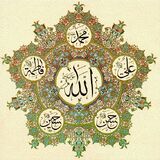Part of a series on  |
|---|
| Beliefs and practices |
| Succession of Ali Imamate of the Family Mourning of Muharram Intercession · Ismah The Occultation· Clergy |
| Views |
| The Qur'an · Sahaba Mu'awiya I · Abu Bakr · Umar |
| Holy days |
| Ashura · Arba'een · Mawlid Eid ul-Fitr · Eid al-Adha Eid al-Ghadeer · Eid al-Mubahila |
| History |
| Twelver · Ismāʿīlī · Zaidi The verse of purification Mubahala · Two things Khumm · Fatimah's house First Fitna · Second Fitna The Battle of Karbala Persecution |
| Ahl al-Kisa |
| Muhammad · Ali · Fatimah Hasan · Husayn |
| Some companians |
| Salman the Persian Miqdad ibn Aswad Abu Dharr al-Ghifari Ammar ibn Yasir Bilal ibn Ribah |
Twelver[]
Usooli and Akhbari Shia Twelver Muslims believe that the study of Islamic literature is a continual process, and is necessary for identifying all of God's laws. Twelver Shia Muslims believe that the process of finding God's laws from the available Islamic literature will facilitate in dealing with any circumstance. They believe that they can interpret the Qur'an and the Twelver Shi'a traditions with the same authority as their predecessors. This process of ijtihad has provided a means to deal with current issues from an Islamic perspective. Generally, the Twelver Shi'a clergy have exerted much more authority in the Twelver Shi'a community than have the Sunni ulema.
Most Sunni scholars, preachers, and judges (collectively known as the Sunni ulema) traditionally believe that the door of ijtihad, or private judgment, needs to be scrutinized by equal counterparts of learned scholars in order for it to be accepted, and needs to be applied solely to matters that do not have a clear dictation in the Quran or the Hadith. Sunni Muslims consider that Sunni scholars had studied the Qur'an and hadith for centuries, during which time they developed the four schools of law (madhhab), and that the height of Islamic knowledge was reached at this time, thus these teachings should be given the highest regard.
Ismaili[]
The term Dāˤī al-Mutlaq (Arabic: الداعي المطلق) literally means "the absolute or unrestricted missionary". In Ismā'īlī Islām, the term dāˤī has been used to refer to important religious leaders other than the hereditary Imāms and the Daˤwa or "Mission" is a clerical-style organization. "The Daˤwa" was a term for the Ismā'īlī faith itself from early on. They are also called Dāˤī Syednas.
See also[]
- Islamic scholars
- List of Ayatollahs
- Imamzadeh
References[]
- Religion and Politics in Iraq. Shiite Clerics between Quietism and Resistance, M. Ismail Marcinkowski (ISBN 9971-77-513-1).
Scholars[]
- Muhammad Ya'qub Kulainy
- Shaikh Saduq
- Sheikh al-Mufid
- Abu Ja'far al-Tusi
- Nasir al-Din Tusi
Contemporary scholars[]
Iraq[]
- Ali al-Sistani
- Bashir Hussain Najafi
- Sayed Muhsin al-Hakim (late)
- Abul-Qassim Khoei (late)
- Muhammad Baqir al-Sadr (late)
Iran[]
- Grand Ayatollah Mohammad Shirazi (late)
- Sadiq Hussaini Shirazi
- Waheed Khorasani
- Ali Khamenei
- Taqi Bahjat
- Naser Makarem Shirazi
- Hossein Noori Hamedani
- Lotfollah Safi Golpaygani
- Ruhollah Khomeini (late)
- Sheikh Mirza Jawad Tabrizi (late)
Lebanon[]
- Muhammad Hussein Fadlallah
Pakistan[]
- Bashir Hussain Najafi
Canada[]
India[]
- Maulana Syed Mazhar-ul-Abbas Rizvi Najafi, Bangalore India, Vakil of Ayathullah Seestani
- Maulana Kalbe Abid(late)
- Maulana Kalbe Sadiq
- Maulana Kalbe Jawad
- Maulana Mirza Mohd Athar
- Maulana Hassan Sadiq
- Shaikh Ahmad Mohammadi,president Islamia school of Kargil, Jammu & Kashmir, India
- Shaikh Tahir ul Quadri